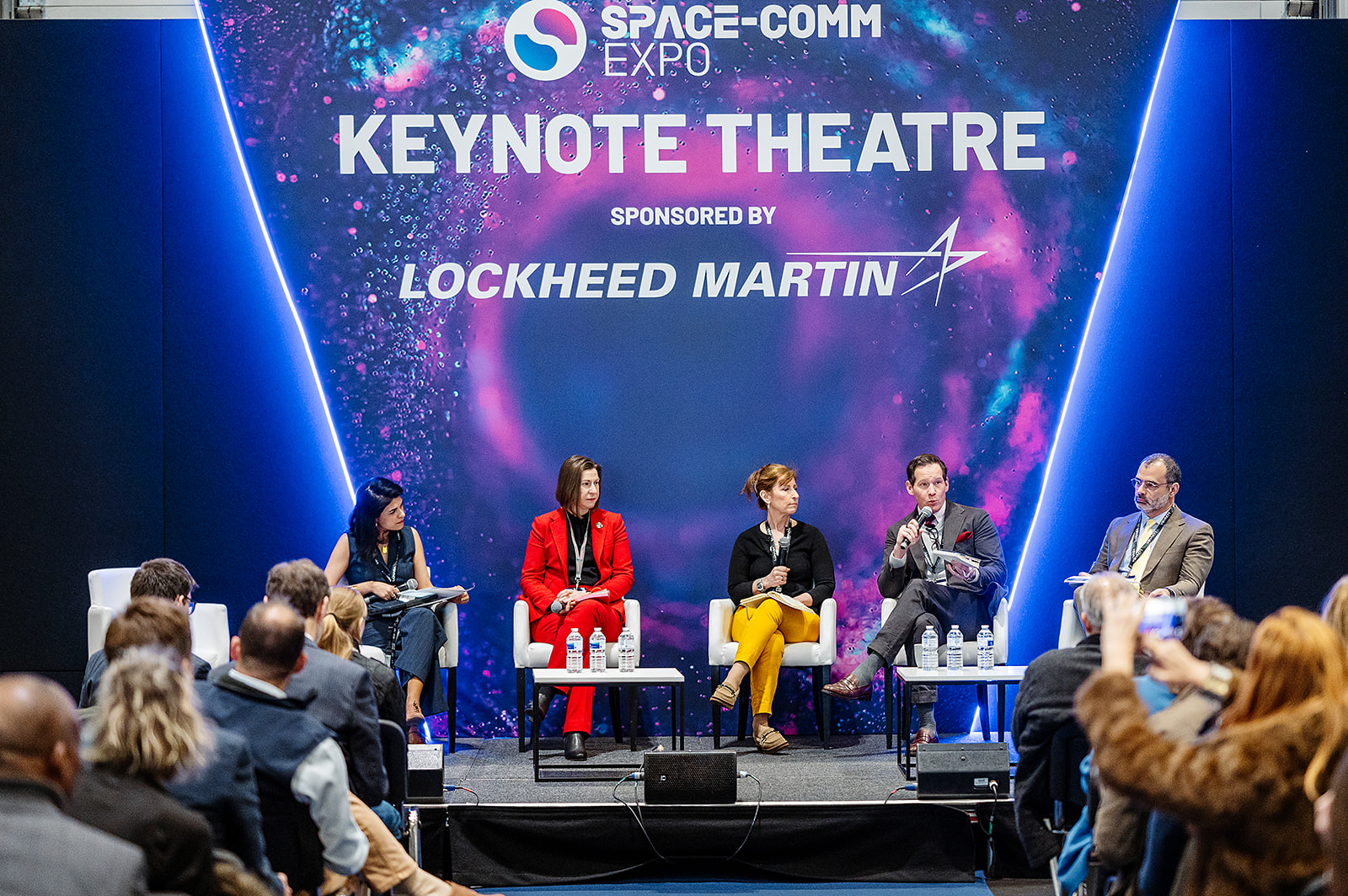Inmarsat CEO calls for net zero in space

Above:
Rajeev Suri addressing the audience at Space-Comm Expo yesterday.
Courtesy
Inmarsat
Among five key recommendations to the gathered UK space sector, Mr Suri will call for a ‘Net Zero’ equivalent for space to ensure the sustainability of the industry and the benefits it brings to people on Earth.
Commenting on the need for sustainability in space, Mr Suri said: "Recent news has seen challenges around the uncontrolled re-entry of space debris and a number of reports of near misses in the ever more congested low earth orbit. We should also pay close attention to the potential risk of collision and the growing challenge of atmospheric pollution posed by de-orbiting satellites – particularly during this rapid expansion phase. Space debris threatens the numerous indispensable services we rely on. Therefore, it should concern us all and it is time to do something about it.
“We talk about Net Zero on Earth … and, today, I am calling for the equivalent to Net Zero for space. This will require: improved tracking and data sharing between space operators. For example, Inmarsat is a founder and Executive Member of the Space Data Association, which works with other geostationary orbit satellite operators to share critical data on satellite positions and movements. This promotes responsible operations to reduce the probability of collisions and space debris, making space operations safer and more reliable. This is a model that can be followed in other satellite orbits.
"The implementation of operational norms of behaviour, such as those suggested recently by Major General DeAnna Burt of the US Space Force.
"A greater focus by regulators on the impacts on the environment of burning up low earth orbit satellites in the atmosphere and on ensuring responsible space operations in that orbit.
“We cannot drive space growth in an unsustainable way. We are committed to space sustainability at Inmarsat. I know that many of you are as well. I would urge that we all come together, with the support of the UK Government, to ensure that this issue is addressed seriously and consistently in the years to come.”
Inmarsat is the largest UK-headquartered space company, responsible for around 1,000 highly skilled direct jobs in the country. It is also the largest civil procurer of UK-made satellites, making it responsible for many more indirect jobs in the space sector. In addition, exports represent the vast majority of the company’s revenues. As a result, Inmarsat is a major source of fuel for the industrial engine of the UK space manufacturing sector.
Mr Suri also explored the crucial choices the UK space sector should explore to secure its future: “There is a risk that those countries and companies that have been leaders in the past could be the laggards in the future. That is not a future I will accept for Inmarsat, and a future that none of us should accept for the UK. … Decisions taken decades in the past have helped to secure a strong position for Inmarsat and given this country a strong foothold in what is a vital industry. But, as the saying goes, past performance is no guarantee of future results.
“As the second space age develops, the choices we make – both as a company and for the wider UK sector – will set our position for decades to come. We have to get those choices right.
“It is time for the UK to get serious about space, before other nations eat our lunch.”
This includes using procurement to drive space sector growth in the UK, as Mr Suri explained: “[We should]… ensure procurement decisions across industry and Government broaden and deepen the supply chain. This is a quick and simple way to ensure that the UK space sector is healthy and robust for the long term.
“Not putting all the country’s eggs in a single company’s basket could ensure long-term growth and diversity in the sector for lasting industrial strength.
“If procurement ‘spreads the wealth’ by diversifying sources of supply it can deliver a broader, deeper and a more resilient overall sector, with speedier growth.
“Inmarsat does not buy all its satellites from the same manufacturer. Diversity of suppliers is critical to us. We recommend that Government consider a similar approach if it wishes to grow the domestic sector.
“For example, the Athena space industry group - of which Inmarsat is a founding member – combines the strength of four leading space businesses, with the growing involvement of further industry partners and small and medium sized enterprises. Athena offers government customers a new alternative to incumbent suppliers that will help grow and broaden UK capabilities from top to bottom within the industry.
“In addition, the UK should choose flagship projects that drive implementation of a national strategy where there is a clear intersection with other priority sectors. For example, consider the often-discussed national Position Navigation and Timing programme. It would increase resilience, reduce reliance on existing, ageing, non-sovereign systems, support domestic jobs and innovation and help meet the requirements of our allies. From our perspective it is absolutely indispensable to the country’s future.”













